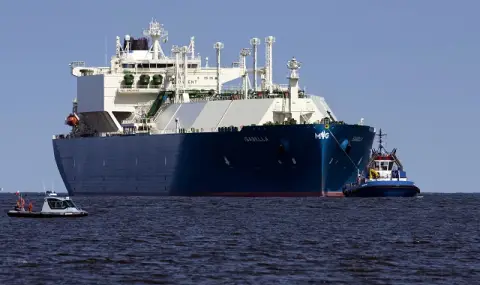Russia's largest liquefied natural gas company "Novatek" this week approached think tanks in Brussels to influence their position on possible tougher European Union (EU) sanctions, the Financial Times reported on Friday. "Novatek" did not immediately respond to a request for comment.
Among them are the Center for European Policy, "Bruegel" and the Center for European Regulation. A request for a meeting with the company's deputy chairman, Denis Solovyov, was made. All think tanks that influence EU decisions through reports and policy proposals have rejected the request. The aim of the meeting was to "have an open discussion on energy security, the role of LNG and recent developments in EU energy policy". A fourth organisation, which asked not to be named, said it had also received the request and said "for now, discussions on the issue are frozen". Solovyov's planned trip to Brussels coincides with a heated debate among EU governments over whether the bloc should ban imports of Russian LNG, which has so far been protected by restrictions imposed in response to the war in Ukraine. At the same time, neither Solovyov nor other leaders Neither Novatek nor the company itself are subject to individual EU sanctions.
"Reuters" reported in December that Solovyov was in Washington working with lobbyists there to contact U.S. government structures.
Fabian Zuleeg, chief executive of the Center for European Policy, said: "Russian economic actors are trying to covertly influence policymaking in the West to have restrictions on their activities lifted. The EU must resist the temptation to re-engage economically with Russia, as Moscow will continue to be more than willing to use weapons of interdependence in the future."
Simone Tagliapietra, a senior fellow at "Bruegel", said Europe was "exposed to a divide-and-conquer strategy by Russia" due to the lack of a unified approach to Russian gas imports "at a time when many people across the continent may be tempted to resort to such gas supplies for lower energy prices".
The publication recalls that this week the European Commission (EC) proposed introducing limited bans on the supply of Russian LNG to EU ports that are not connected to the bloc's main gas network. This proposal has not yet received support among the bloc's 27 governments and must be unanimously supported to be adopted.
The new package of sanctions comes just as new data shows that the EU imported record volumes of LNG from Russia last month. Last year, LNG exports from Moscow to the EU increased by almost 20 percent compared to 2023, according to a report published on Tuesday.
The EU has so far banned imports of most Russian coal and oil, but has repeatedly failed to curb gas purchases from Moscow, amid long-standing opposition from countries such as Hungary.
Most of Russia’s liquefied natural gas arrives at ports in Spain, Belgium and France from the Yamal plant, a huge facility in frigid northern Siberia.
But other countries in the bloc rely on indirect purchases of the supercooled fuel. Russian liquefied natural gas accounts for up to 9 percent of Germany’s gas imports in 2023, according to the same report.
President Donald Trump has signaled his readiness to impose further restrictions on the Russian economy if the Kremlin does not end the war soon.
